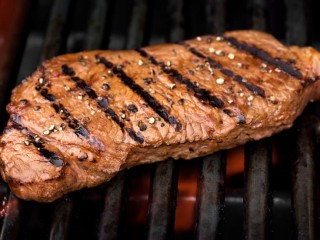 A new study has highlighted the role that meat-eating has played in the evolutionary success of humankind.
A new study has highlighted the role that meat-eating has played in the evolutionary success of humankind.
The study by Swedish and German researchers shows that when humans began to eat meat and eventually hunt, their new, higher quality diet allowed them to wean babies earlier than other species, such as the Great Ape.
That meant that women could then give birth to more children during their reproductive life, which contributed to the gradual spread of the human population over the world.
The link between eating meat and a faster weaning process was shown by the study of 67 mammalian species.
The research revealed a clear pattern that showed that learning to hunt was a decisive step in human evolution.
Hunting required communication, planning and the use of tools, which in turn demanded a larger brain. Adding meat to the diet made it possible to develop a larger brain.
This has been known for a long time. However, no one has previously demonstrated the strong strong link between meat eating and the duration of breast-feeding.
“By eating meat, the breast-feeding periods and thus the time between child births must have been shorter,” researcher Elia Psouni of Lund University in Sweden said.
“This must have been vitally important to human evolution.“
Elia Psouni is a developmental psychologist and has, together with neurophysiologist Martin Garwicz (also in Lund) and evolutionary geneticist Axel Janke (currently in Frankfurt but previously in Lund) published her findings in the online science journal PLoS ONE.
Many researchers have tried to explain the comparatively short breast-feeding period of humans with social and behavioural theories of parenting and family size.
However the Lund group has now shown that humans do not differ from other mammals when it comes to the timing of weaning. When brain development and diet composition are included in the equation, the time when human children stop suckling fits precisely with the pattern in other mammals.
The research team entered data on 67 mammalian species of various types into a mathematical model based on brain size and diet. Species which consumed at least 20 per cent of their diet energy content from meat were classified as carnivores.
The model showed animals of all species stop suckling their young when their brans have reached a certain stage of development on the path between conception and full brain-size. The high quality diet of carnivores allows them to cease suckling their young at an earlier age than herbivores and omnivores. The model also showed that humans do not differ from other carnivores with respect to timing of weaning.
All carnivorous species, from small animals such as ferrets and raccoons to large animals like panthers, killer whales and humans, had a short breast-feeding period.
The difference between us and the great apes, which has puzzled earlier scholars, came down to the point that humans are carnivores, whereas gorillas, orangutans and chimpanzees are herbivores or omnivores.
She was also careful to emphasise that the research group’s study was about human evolution. “The research is about how the eating of meat may have contributed to the spread of mankind over the earth, and says nothing about what we should or should not eat today to have a good diet.”
